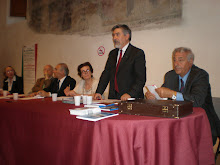Energy and Politics: Behind the Scenes of the Nabucco-TAP Competition, by N.Sartori
 The EU launched the Southern Gas Corridor initiative with the twofold aim of strengthening the diversification of Europe's gas sources and transportation routes, and reducing the role of upstreamers in the European gas market. The preference expressed by the European Commission - the corridor’s mastermind - for the Nabucco pipeline was expected to weigh in heavily, allowing the EU-backed project to easily win the competition. However, other factors ende d up tilting the balance decisively in favour of Nabucco West's final rival, the Trans-Adriatic Pipeline (TAP). These include the technical and commercial criteria set out by the Shah Deniz II consortium, Nabucco West's complex organizational and decision-making procedures, the attractiveness of the exemption from Third Party Access (TPA) granted by the EU to TAP, and SOCAR's specific interest in the Greek market. When it comes to energy, political support not always represents the decisive element, and may be counterproductive at times.
The EU launched the Southern Gas Corridor initiative with the twofold aim of strengthening the diversification of Europe's gas sources and transportation routes, and reducing the role of upstreamers in the European gas market. The preference expressed by the European Commission - the corridor’s mastermind - for the Nabucco pipeline was expected to weigh in heavily, allowing the EU-backed project to easily win the competition. However, other factors ende d up tilting the balance decisively in favour of Nabucco West's final rival, the Trans-Adriatic Pipeline (TAP). These include the technical and commercial criteria set out by the Shah Deniz II consortium, Nabucco West's complex organizational and decision-making procedures, the attractiveness of the exemption from Third Party Access (TPA) granted by the EU to TAP, and SOCAR's specific interest in the Greek market. When it comes to energy, political support not always represents the decisive element, and may be counterproductive at times.
 The EU launched the Southern Gas Corridor initiative with the twofold aim of strengthening the diversification of Europe's gas sources and transportation routes, and reducing the role of upstreamers in the European gas market. The preference expressed by the European Commission - the corridor’s mastermind - for the Nabucco pipeline was expected to weigh in heavily, allowing the EU-backed project to easily win the competition. However, other factors ende d up tilting the balance decisively in favour of Nabucco West's final rival, the Trans-Adriatic Pipeline (TAP). These include the technical and commercial criteria set out by the Shah Deniz II consortium, Nabucco West's complex organizational and decision-making procedures, the attractiveness of the exemption from Third Party Access (TPA) granted by the EU to TAP, and SOCAR's specific interest in the Greek market. When it comes to energy, political support not always represents the decisive element, and may be counterproductive at times.
The EU launched the Southern Gas Corridor initiative with the twofold aim of strengthening the diversification of Europe's gas sources and transportation routes, and reducing the role of upstreamers in the European gas market. The preference expressed by the European Commission - the corridor’s mastermind - for the Nabucco pipeline was expected to weigh in heavily, allowing the EU-backed project to easily win the competition. However, other factors ende d up tilting the balance decisively in favour of Nabucco West's final rival, the Trans-Adriatic Pipeline (TAP). These include the technical and commercial criteria set out by the Shah Deniz II consortium, Nabucco West's complex organizational and decision-making procedures, the attractiveness of the exemption from Third Party Access (TPA) granted by the EU to TAP, and SOCAR's specific interest in the Greek market. When it comes to energy, political support not always represents the decisive element, and may be counterproductive at times.
• The Winner is TAP: The EU's Failed Policy in the South Caucasus, by N.Mikhelidze
 Between the two competitors for the delivery of Azerbaijani gas to Europe Nabucco West and the Trans-Adriatic Pipeline (TAP) the winner is the latter, a project designed to transport Caspian gas via Greece and Albania and across the Adriatic Sea to southern Italy. The EU welcomed the decision of the Shah Deniz consortium. Yet the political objective of the Southern Corridor was to diversify gas supp ly to Europe and reduce the energy dependence of some EU member states on Russia. With TAP as the winner, it is questionable whether the EU has truly met these goals. As for Azerbaijan, the selection of TAP can be viewed as a commercially sound decision and a political balancing act by Baku to gain access to European markets and to avoid angering the Kremlin. Yet this choice came only after President Alyev failed to convince the EU to take a clearer stance on the Nagorno-Karabakh conflict resolution process in exchange for Nabucco West.
Between the two competitors for the delivery of Azerbaijani gas to Europe Nabucco West and the Trans-Adriatic Pipeline (TAP) the winner is the latter, a project designed to transport Caspian gas via Greece and Albania and across the Adriatic Sea to southern Italy. The EU welcomed the decision of the Shah Deniz consortium. Yet the political objective of the Southern Corridor was to diversify gas supp ly to Europe and reduce the energy dependence of some EU member states on Russia. With TAP as the winner, it is questionable whether the EU has truly met these goals. As for Azerbaijan, the selection of TAP can be viewed as a commercially sound decision and a political balancing act by Baku to gain access to European markets and to avoid angering the Kremlin. Yet this choice came only after President Alyev failed to convince the EU to take a clearer stance on the Nagorno-Karabakh conflict resolution process in exchange for Nabucco West.
 Between the two competitors for the delivery of Azerbaijani gas to Europe Nabucco West and the Trans-Adriatic Pipeline (TAP) the winner is the latter, a project designed to transport Caspian gas via Greece and Albania and across the Adriatic Sea to southern Italy. The EU welcomed the decision of the Shah Deniz consortium. Yet the political objective of the Southern Corridor was to diversify gas supp ly to Europe and reduce the energy dependence of some EU member states on Russia. With TAP as the winner, it is questionable whether the EU has truly met these goals. As for Azerbaijan, the selection of TAP can be viewed as a commercially sound decision and a political balancing act by Baku to gain access to European markets and to avoid angering the Kremlin. Yet this choice came only after President Alyev failed to convince the EU to take a clearer stance on the Nagorno-Karabakh conflict resolution process in exchange for Nabucco West.
Between the two competitors for the delivery of Azerbaijani gas to Europe Nabucco West and the Trans-Adriatic Pipeline (TAP) the winner is the latter, a project designed to transport Caspian gas via Greece and Albania and across the Adriatic Sea to southern Italy. The EU welcomed the decision of the Shah Deniz consortium. Yet the political objective of the Southern Corridor was to diversify gas supp ly to Europe and reduce the energy dependence of some EU member states on Russia. With TAP as the winner, it is questionable whether the EU has truly met these goals. As for Azerbaijan, the selection of TAP can be viewed as a commercially sound decision and a political balancing act by Baku to gain access to European markets and to avoid angering the Kremlin. Yet this choice came only after President Alyev failed to convince the EU to take a clearer stance on the Nagorno-Karabakh conflict resolution process in exchange for Nabucco West.
• What Role for the Commission in the New Governance of the Economic and Monetary Union?, by R.Cisotta
 In recent years, the EU and its member states have tried to offer credible responses to the financial and economic crisis often outside the EU legal order and with a significant impact on the institutional balance of the Union itself. Many of these reforms concern the Commission, which has been entrusted with new tasks mainly related to the provision of financial assistance to member states experiencing major economic difficulties, the overview of national budget ary decisions and, to a lesser extent, actions to foster economic growth. In some areas – like the new rules on fiscal discipline – the Commission has gained strong powers. The solutions raise many legal concerns and may alter long-standing balances between institutions. Furthermore, they are clearly inspired by intergovernmentalism and principally conceived within intergovernmental structures like the European Council.
In recent years, the EU and its member states have tried to offer credible responses to the financial and economic crisis often outside the EU legal order and with a significant impact on the institutional balance of the Union itself. Many of these reforms concern the Commission, which has been entrusted with new tasks mainly related to the provision of financial assistance to member states experiencing major economic difficulties, the overview of national budget ary decisions and, to a lesser extent, actions to foster economic growth. In some areas – like the new rules on fiscal discipline – the Commission has gained strong powers. The solutions raise many legal concerns and may alter long-standing balances between institutions. Furthermore, they are clearly inspired by intergovernmentalism and principally conceived within intergovernmental structures like the European Council.
 In recent years, the EU and its member states have tried to offer credible responses to the financial and economic crisis often outside the EU legal order and with a significant impact on the institutional balance of the Union itself. Many of these reforms concern the Commission, which has been entrusted with new tasks mainly related to the provision of financial assistance to member states experiencing major economic difficulties, the overview of national budget ary decisions and, to a lesser extent, actions to foster economic growth. In some areas – like the new rules on fiscal discipline – the Commission has gained strong powers. The solutions raise many legal concerns and may alter long-standing balances between institutions. Furthermore, they are clearly inspired by intergovernmentalism and principally conceived within intergovernmental structures like the European Council.
In recent years, the EU and its member states have tried to offer credible responses to the financial and economic crisis often outside the EU legal order and with a significant impact on the institutional balance of the Union itself. Many of these reforms concern the Commission, which has been entrusted with new tasks mainly related to the provision of financial assistance to member states experiencing major economic difficulties, the overview of national budget ary decisions and, to a lesser extent, actions to foster economic growth. In some areas – like the new rules on fiscal discipline – the Commission has gained strong powers. The solutions raise many legal concerns and may alter long-standing balances between institutions. Furthermore, they are clearly inspired by intergovernmentalism and principally conceived within intergovernmental structures like the European Council.






















































































Nessun commento:
Posta un commento